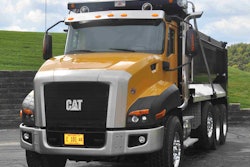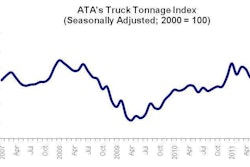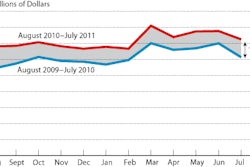NASSTRAC, an industry association that represents the interests of freight shippers in all modes of transportation, coordinated a Washington “fly-in” Sept. 27-28. Nearly 20 transportation executives met with a dozen members of Congress or their aides on critical trucking issues, including the need for infrastructure investment, concerns about changes to the existing truck driver hours-of-service rules and restrictions on truck size and weight.
“Shippers rely heavily on the safe, reliable, cost-effective service that over-the-road truck transportation offers them,” says Brian Everett, NASSTRAC’s executive director. “In fact, more than 70 percent of freight shipments, by value and by tons, move by truck. Unfortunately, there are a number of advocacy issues currently being considered by lawmakers that will have a negative impact on trucking productivity and efficiency if passed, ultimately increasing transportation and supply chain costs by up to 10 percent. That’s why NASSTRAC believes that now, more than ever, there’s a significant need to stand up for trucking.”
NASSTRAC shippers met with aides of a number of legislators, including Reps. Tim Walz (D-Minn.), Tom Petri (R-Wis.) and John Duncan Jr. (R-Tenn.); and Sens. Richard Durbin (D-Ill.), John Rockefellar IV (D-W.Va.), Max Baucus (D-Mont.), Barbara Boxer (D-Calif.), Amy Klobuchar (D-Minn.) and Alexander Lamar (R-Tenn.).
During the fly-in, NASSTRAC members encouraged members of Congress to support highway infrastructure funding and to oppose changes to the current hours-of-service rules. They also encouraged them to oppose the expansion of FMCSA’s role in regulating America’s businesses, oppose the Safe Highways and Infrastructure Protection Act, which would limit truck size and weight, and support the Safe and Efficient Transportation Act.
“If Congress fails to take action in support of America’s trucking industry and its customers, the result will be significant increases in costs for companies across America and significant decreases in efficient distribution and transportation,” says Everett. “Businesses and consumers will be worse off as a result of increased costs and decreased productivity. Unemployment will rise. The recession, high fuel prices, roadway congestion and a shortage of qualified drivers all have led to reduced capacity and increased transit times for our most critical transportation mode, trucking. Neither our economy nor our country can afford more of the same.”











